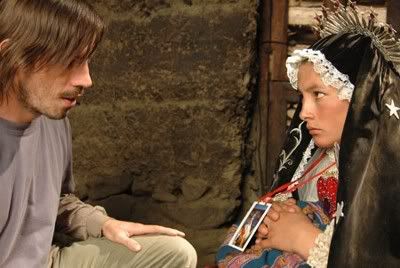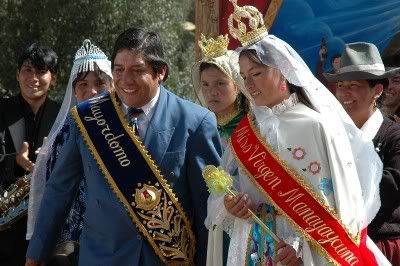Madeinusa is a young girl who lives with her sister and her father, who is the mayor of Manayaycuna, their town, which is getting prepared for the Holy Week festivities. Salvador, a young man from the coast, arrives, apparently, to work on a mining project. He sees one of the festivities, in which several girls from town compete on who will be the Virgin Mary for the procession. Madeinusa wins and Salvador takes a picture of her. Because of this, he is locked up, being told that the villagers don’t like foreigners.
In town, Madeinusa acts like weeping Virgin Mary who goes along a statue of Jesus Christ who just died on the cross, towards a church. After that, the whole town celebrates because God is dead and for 3 days won’t see what they do.
 Salvador: "So, let me get this straight: On Good Friday, God dies and therefore
Salvador: "So, let me get this straight: On Good Friday, God dies and thereforecan't see all the sins you will commit?"
Madeinusa: "Let's have sex! NOW!"
Salvador breaks free and starts walking around town. He then meets with Madeinusa, who proceeds to seduce him and finally having sex with him. Madeinusa then asks him to take her to Lima, the capital in the Coast. Salvador refuses and she goes away, angry.
At night, when one of the town’s women is taking Madeinusa clothes off, she notices blood and realizes she is not a virgin anymore. She goes and tells her father, who takes her home. When Salvador goes by their house, he hears people having sex.
The next day Salvador wakes up drunk and is guided to a weird ritual in which some women are choosing men to have sex at night. Salvador leaves, disgusted. At night, the mayor takes him to the second floor of his house, and he shows him all the offerings the people have given to the church. Madeinusa is also there. He then tells Salvador that he can take anything and go back to Lima. Salvador refuses and leaves, and the mayor then leaves Madeinusa locked up. However, she escapes and goes to Salvador, who finally agrees to take her to Lima. They are leaving, but at night, she remembers she doesn’t have her mother’s earrings. She comes back and finds that her father has broken them.
Madeinusa waits for the morning and prepares soup for her father, but it is poisoned. Salvador comes back, looking for Madeinusa, but find the mayor, dead. Madeinusa’s sister arrives and thinks he killed her father and starts calling for the people.
At the end, we only see Madeinusa in a truck going to Lima, without Salvador. His camera is seen lying among the Holy Week offerings.
Some people criticized the movie because, they said, it depicted villagers from the Peruvian mountains as crazy people, while the one arriving from the coast is the civilized one. This however is an impression one can have, especially if it’s the first time one lives through local celebrations. Usually during these celebrations, there is great display of religiosity, but also men and women get drunk, there is violence and some people get injured.
This is a nice depiction of the religious hypocrisy that is lived through ritual that are respected simply because tradition is an unmovable force in such places. Traditions and customs are respected, especially if they have some religious meaning, and under that excuse, people will do whatever they want. It doesn’t matter if you got drunk, hit your wife or had a child out of wedlock, if it was during the saint’s celebration, it’s all ok.



No comments:
Post a Comment
Blasfema libremente